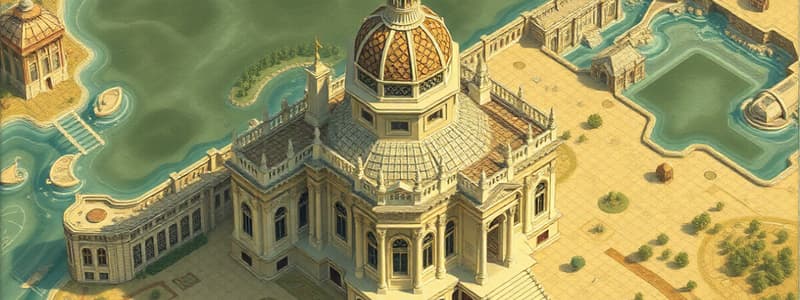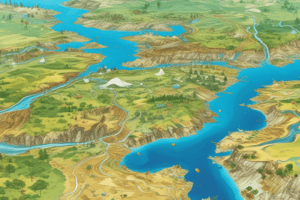Podcast
Questions and Answers
What is the primary purpose of a map in cartography?
What is the primary purpose of a map in cartography?
- To create fictional stories
- To provide geographical information (correct)
- To decorate walls
- To store personal memories
All map projections accurately represent all properties of the Earth without distortion.
All map projections accurately represent all properties of the Earth without distortion.
False (B)
What is a common geographic coordinate system used in mapping?
What is a common geographic coordinate system used in mapping?
Latitude and Longitude
The _____ maps show multiple themes, allowing users to analyze spatial distribution of data more easily.
The _____ maps show multiple themes, allowing users to analyze spatial distribution of data more easily.
Match the following map types with their descriptions:
Match the following map types with their descriptions:
Which of the following is NOT a factor considered in map making?
Which of the following is NOT a factor considered in map making?
User-generated content in mapping can increase the risk of inaccuracies.
User-generated content in mapping can increase the risk of inaccuracies.
What is the significance of Ptolemy's map in cartographic history?
What is the significance of Ptolemy's map in cartographic history?
In cartography, _____ is the science of obtaining geographical information through distance sensing.
In cartography, _____ is the science of obtaining geographical information through distance sensing.
Match the following terms with their definitions:
Match the following terms with their definitions:
What aspect of geography do time zones primarily relate to?
What aspect of geography do time zones primarily relate to?
The equator is the only line of latitude that is considered a great circle.
The equator is the only line of latitude that is considered a great circle.
What is the term for maps that provide information for administrative purposes and land ownership?
What is the term for maps that provide information for administrative purposes and land ownership?
Effective communication of geographic information relies on _____.
Effective communication of geographic information relies on _____.
Which of the following statements about cartography is accurate?
Which of the following statements about cartography is accurate?
What is one key characteristic of a cylindrical projection?
What is one key characteristic of a cylindrical projection?
Cylindrical projections create less distortion at the poles than at the equator.
Cylindrical projections create less distortion at the poles than at the equator.
Name one point of tangency for cylindrical projections.
Name one point of tangency for cylindrical projections.
A cylindrical projection maps the Earth's surface onto a __________.
A cylindrical projection maps the Earth's surface onto a __________.
Match the following types of map projections with their characteristics:
Match the following types of map projections with their characteristics:
What is a significant drawback of map projections?
What is a significant drawback of map projections?
The equator is the only line that experiences no distortion in cylindrical projections.
The equator is the only line that experiences no distortion in cylindrical projections.
Identify one factor that causes distortion in map projections.
Identify one factor that causes distortion in map projections.
The __________ describes the shape of the Earth and is used in map projections.
The __________ describes the shape of the Earth and is used in map projections.
Match the following terms related to map projections with their definitions:
Match the following terms related to map projections with their definitions:
Which of the following terms relates to the vertical angle used in projections?
Which of the following terms relates to the vertical angle used in projections?
All cylindrical projections use the same point of tangency for accurate representation.
All cylindrical projections use the same point of tangency for accurate representation.
What is a common method for determining Eastings in a projection system?
What is a common method for determining Eastings in a projection system?
In cylindrical projection, __________ are represented as straight lines.
In cylindrical projection, __________ are represented as straight lines.
Flashcards are hidden until you start studying
Study Notes
Cartography
- Mapmaking is a tool for the public.
- Personalized, user-generated content is not authoritative.
- Examining maps as historical documents is important.
- Maps can be viewed as works of art.
- An increase in inaccurate maps created by people without cartographic training increases risk to users.
Remote Sensing
- The science of obtaining geographical information through distance, via satellites, is important and widely used.
- Satellites are critical to creating cadastral property boundaries maps for re-establishment.
History of Cartography: Early Understandings
- Ptolemy's map was an early attempt to map the world.
- Early maps often represented multiple themes, with one set of data representing multiple concepts.
- Having one theme for one data set makes it easier for the user to examine the spatial distribution of certain data.
- Jerusalem was frequently shown as the center of the known world in ancient maps.
Cities and Cartography
- A common, standardized geographic coordinate system is important for exact location on Earth.
- A shared geographic coordinate system allows for effective data sharing and communication.
- Establishing a standardization of data sharing will improve maps and communication.
The Importance of Latitude and Longitude
- Latitude and longitude help express location on the Earth.
- Meridians are lines of longitude that measure distance east to west of the prime meridian.
- The distance between meridians gets shorter as you move toward the poles.
- The cosine of latitude is used to determine the distance between meridians at different latitudes.
Time zones
- Time zones were established to account for the Earth's rotation.
- They are helpful to determine the amount of sunlight a region has.
- Understanding time zones is important for communication purposes.
Great Circles
- A Great Circle is any circle on Earth that passes through the center of the Earth.
- The equator is a Great Circle.
- Meridians are not Great Circles except for the prime meridian.
- The shortest distance between two points on Earth's surface is along a Great Circle.
Map Projections
- All map projections distort something. There is no perfect projection.
- Distortions are introduced by the projection process.
- The goal of map projections is to represent the Earth's curved surface on a flat surface.
Types of Projections
- Equal-Area projections maintain the relative sizes of areas but may distort shapes.
- Conformal projections preserve the shape of small areas but may distort sizes.
- Compromise projections attempt to minimize distortion in both size and shape.
Azimuthal Projections
- These projections have the point of tangency at the North or South Pole.
- They are useful for showing areas surrounding the poles.
- They distort shapes and sizes as the distance from the point of tangency increases.
Cylindrical Projections
- The Earth is projected onto a cylinder which is then unwrapped to create a flat map.
- The cylinder can be tangent to the Earth at the equator, a meridian, or elsewhere.
- Meridians and parallels form a grid on a cylindrical projection.
- Cylindrical projections are commonly used for world maps.
Datum
- A datum is a reference surface used for the Earth's shape.
- It is an ellipsoid that approximates the shape of the Earth.
- The geoid is a more accurate representation of the Earth's shape, taking into account the Earth's gravity.
The North American Datum (NAD)
- NAD is the reference surface used for maps and surveying in North America.
- NAD83 is the current version of the datum.
- NAD is constantly being updated to reflect the Earth's changing shape and location.
The Geoid
- The Geoid is a more accurate representation of the Earth's shape than a reference ellipsoid.
- It is a surface that follows the mean sea level at every point on Earth.
- The Geoid is used for precise surveying and mapping.
Studying That Suits You
Use AI to generate personalized quizzes and flashcards to suit your learning preferences.




